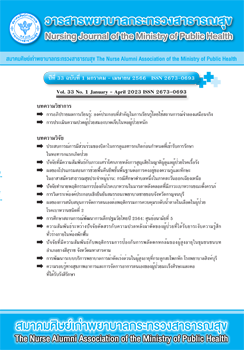Factors Predicting Diabetes Prevention Behaviors among Postpartum Women with Gestational Diabetes Mellitus
Main Article Content
Abstract
The purpose of this predictive study was to analyze diabetes prevention behaviors and investigate determinants influencing diabetes prevention behaviors in postpartum women with gestational diabetes mellitus. Participants were 102 postpartum women with gestational diabetes who attended the obstetrics and gynecology clinic or diabetes clinic at one of three tertiary care hospitals in the Eastern Economic Corridor (EEC). Data were collected by self-reported questionnaires from March to August 2022. The content validity indices and Cronbach’s alpha of the questionnaires ranged from .91-1.00 and .71-91, respectivety. Descriptive statistics and standard multiple regression were utilized to analyze the data. The findings indicated that the mean score for participants’ diabetes prevention behaviors was 52.48 (SD=6.14). Self-efficacy (ß=.639, t=8.129, p<.001) and social support (ß=.179, t=2.274, p=.025) were significant factors in predicting diabetes prevention behaviors. They accounted for 56.3% (R2=.563, F2,99=63.680, p<.001) of the variance in diabetes prevention behaviors. The findings imply that nurses and other healthcare providers should increase self-efficacy and social support among postpartum women with gestational diabetes mellitus to reduce the development of diabetes later in life.
Article Details

This work is licensed under a Creative Commons Attribution-NonCommercial-NoDerivatives 4.0 International License.
บทความและรายงานวิจัยในวารสารพยาบาลกระทรวงสาธารณสุข เป็นความคิดเห็นของ ผู้เขียน มิใช่ของคณะผู้จัดทำ และมิใช่ความรับผิดชอบของสมาคมศิษย์เก่าพยาบาลกระทรวงสาธารณสุข ซึ่งสามารถนำไปอ้างอิงได้
References
Sivaramana SC, Vinnamalab S, Jenkins D. Gestational diabetes and future risk of diabetes. J Clin Med
Res 2013;5(2):92-6.
Auvinen AM, Luiro K, Jokelainen J, Jarvela I, Knip M, Auvinen J, Tapanainen JS. Type 1 and type 2
diabetes after gestational diabetes: a 23 year cohort study. Diabetologia 2020;63:2123-8.
Wanthong S, Lertwattanarak R, Sunsaneevithayakul P, Sriussadaporn S, Vannasaeng S, Sriwijitkamol
A. High prevalence of diabetes and abnormal glucose tolerance in Thai women with previous gestational
diabetes mellitus. J Clin Transl Endocrinol 2017;9:21-4.
Wangchom S, Xuto P, Kantaruksa K. Physical activity, dietary quality, breastfeeding and weight retention
among 6 month postpartum mothers. Nursing J 2019;46(4):94-107.(in Thai)
Tachasuksri T. Gestational diabetes mellitus: nursing care focusing on self-management. Pathum Thani:
N4 Proprint;2021.(in Thai)
Tobias DK, Hu FB, Chavarro J, Rosner B, Mozaffarian D, Zhang C. Healthful dietary patterns and type
diabetes mellitus risk among women with a history of gestational diabetes mellitus. Arch Intern Med
;172(20):1566-72.
Bao W, Tobias DK, Bowers K, Chavarro J, Vaag A, Grunnet LG, et al. Physical activity and sedentary
behaviors associated with risk of progression from gestational diabetes mellitus to type 2 diabetes mellitus:
a prospective cohort study. JAMA Internal Med 2014;174(7):1047-55.
Rosenstock IM, Strecher VJ, Becker MH. The health belief model and HIV risk behavior change. In:
Diclement RJ, Peterson JL, editors. Preventing AIDS: theories and methods of behavioral interventions.
New York: Plenum press;1994.5-24.
Kaewsringam P, Nirattharadorn M, Wattana C. Factors predicting type II diabetes mellitus preventive
behaviors among people at risk for diabetes. JNSCU 2015;27(2):119-31.(in Thai)
Soynahk C, Kompayak J, Punthasee P. A study of health belief model and the risk of type 2 diabetes
in working Muslim populations. JRTAN 2018;19(Supplement):267-77.(in Thai)
Maka Y, Chareonsanti J, Sriarporn P. Perceived susceptibility, self-efficacy, and exercise behaviors
among postpartum women with gestational diabetes mellitus. Nursing J 2020;47(1):35-44.(in Thai)
Tachasuksri T, Radarith C, Siriarunrat S. A causal model of two-hour postprandial blood glucose levels
among women with gestational diabetes mellitus. Nurs Sci J Thai 2020;38(4):15-30.(in Thai).
Wutthisarn K, Siriarunrat S, Tachasuksri T. Relationships between health beliefs and eating behaviors
of pregnant women who had overweight before pregnancy. CHJ 2017;4(1):19-26.(in Thai)
Chonburi Hospital. Annual Report. Chonburi;2021.(in Thai)
Ngamchay C, Tachasuksri T, Siriarunrat S. Predicting factors of eating behaviors among pregnant
women working in industrial factories. JFONUBUU 2020;28(1):48-59.(in Thai)
Karabutr T, Tachasuksri T, Siriarunrat S. The effects of a self-management program on weight control
behaviors and appropriate weight gain among overweight and obese pregnant women. SCNJ 2022;9(2):40-53.
(in Thai)
Tachasuksri T, Siriarunrat S, Suppasri P, Suppaseemanont W, Boonnate N, Kwannate C. Causal model
for quality of life among pregnant women. SCNJ 2017;4(1):28-46.(in Thai)
Puspita T, Jerayingmongkol P, Sanguanprasit B. Factors predicting self-care behaviors among pregnant
women in Garut District, West Java Province, Indonesia. In Asian Academic Society International Conference
May 13
Phetcharak k, Mayukhachot S, Tewasekson N, Wannakeaw Y, Chitjumnong F. Factors associated behavior
prevention and behavior prevention of gestational diabetes mellitus in pregnant women risk of gestational
diabetes mellitus. udhhosmj 2021;29(1):11-21.(in Thai)
Satarak P, Therakulchai J, Khanobdee C. The influence of personal factors, perceived benefit, barrier,
self-efficacy, and social support on weight control behaviors of pregnant women with over pre-pregnancy
body mass index. J Hlth Sci Res 2017;11(2):81-92.(in Thai)

